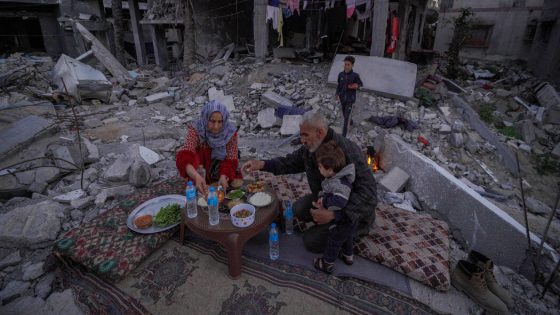Every night during the Muslim holy month of Ramadan, the man would come along Rawoand Altatar’s street, banging on his drum and calling out to the faithful to wake them up for suhoor, the predawn meal. His nightly mission used to be lit up by Ramadan lamps and twinkling decorations.
But this Ramadan, Ms. Altatar’s street is eerie. The man, called a musahharati in Arabic, is absent. There are no decorations or electricity, and the street is surrounded by buildings destroyed or damaged in Israel’s bombardment. Their own home has been partially destroyed as well.
“There is no sense of Ramadan,” she said, referring to the month when Muslims fast all day. “We are missing our family and gatherings, the food, even the simplest thing like the sweet juices, the Ramadan decorations and lamps, which filled the streets,” said Ms. Altatar, a photographer who worked at a private school before the war.
Israel’s war in Gaza has transformed Ramadan, which began on Monday, from one of color and boisterous gatherings into one observed against a backdrop of gray rubble and dark, empty streets.
With no hoped-for cease-fire between Israel and Hamas, the armed group that has controlled Gaza for years, a time of religious devotion, dawn-to-dusk fasting and charity is now a daily struggle for survival. For many Gazans, attempts to bring some cheer into the enclave are up against a mountain of despair.
More than 30,000 Palestinians have been killed in Israel’s bombardment, according to Gazan health authorities, and the threat of famine looms as a result of Israel’s near-complete siege. The war, now in its sixth month, began after Hamas attacked Israel on Oct. 7, killing some 1,200 people and taking around 240 captives, according to Israeli officials.
Families, which once gathered over big feasts to mark the end of a day’s fast, have been separated and dispersed as most of Gaza’s 2.2 million residents have fled their homes. Many now live in crowded tent encampments.
Many mosques where nightly Ramadan prayers were held have been bombed to rubble. Israel has accused Hamas of operating from some of Gaza’s mosques, a charge Hamas denies.
The most basic sustenance, like the dates and drinking water with which Muslims traditionally break their fast, are nearly absent.
Also missing is the happiness of children, especially when they come out in the streets after iftar — the breaking of the fast — with their Ramadan lamps and toys, she said.
“Now everyone is inside their homes even before the sun goes down, feeling afraid,” she said.
Ramadan this year also comes as many Gazans have lost everything and the enclave is nearing a famine, United Nations officials say. At least 27 Palestinian children have died from malnutrition, dehydration and lack of baby formula, Gazan health officials have said.
Human rights groups, U.N. experts and most recently the European Union’s foreign policy chief have said that Israel is deliberately starving Palestinians. Israel has insisted throughout the war that it is committed to allowing as much aid into Gaza as possible and it has blamed delays on the U.N. staffing and logistics. Aid groups and U.N. officials have argued that it would be better for Israel to ease entry restrictions for trucks at established crossing points into the enclave and to do more to speed the delivery of goods inside Gaza.
People in Gaza are so hungry that some have resorted to eating leaves and animal feed.
“We’ve been practically fasting for months,” Ms. Altatar said. “Before Ramadan, we were eating two meals a day if we were able to find enough food. Otherwise, we would eat only once a day, at sundown.”
Almost no aid is reaching northern Gaza, where Ms. Altatar lives with her parents. U.N. agencies have largely stopped sending aid to the north, citing Israeli restrictions and security fears.
Many Muslims customarily try to read the entire Quran over the month of Ramadan and perform extra nightly prayers called taraweeh.
“In the north, people rarely gather to pray taraweeh in an open area because they are afraid of being hit by an airstrike,” she said. “Of course, there are almost no mosques left. They have all been bombed.”
Her days now are filled with gathering firewood, making fires and roaming markets trying to cobble together a meal her family can afford, she said.
As she walks, she dreams that one of the aid airdrops will come down near her.
In what seemed like cruel mocking for many Gazans, days before Ramadan began, a resident said Israeli warplanes dropped leaflets over parts of northern Gaza that read, “May your fast be accepted, your sins forgiven and iftar delicious.”
Asked about the leaflets, the Israeli military did not respond to repeated requests for comment.
Despite the war and continued presence of Israeli ground forces, some Gazans have tried to imbue the holy month with as much festivity and religious observance as the conflict will allow.
“In northern Gaza, hunger and fear has taken over us,” Maher Habboush, a body builder in Gaza, said in a video on his Instagram account. The video showed dozens of children and adults cleaning the streets of one neighborhood and painting the walls pink, blue and yellow. “But we will greet the blessed month with happiness and optimism, because Ramadan is a blessing.”
In previous years, Gazans competed with each other when decorating their homes and streets. Now a Ramadan lantern, called a fanous and once ubiquitous throughout the streets and homes of Gaza, is a luxury few can afford.
“All day my little daughter is crying for a fanous,” said Nisreen Abu Tooq, 28, a mother of five who fled with her family from the north to a school in southern Gaza. “I can’t even afford to buy it. We can’t cheer up our little kids up with the simplest things.”
On Sunday, Ms. Abu Tooq said she was filled with sadness when she heard that the next day was Ramadan, because she had not expected the war to last this long.
“It’s a big difference to be in a place you don’t belong and far from your home with relatives, neighbors and friends,” she said.
Fadia Nassar, 43, wanted to buy Ramadan lanterns for her daughter, nieces and nephews, who are all sharing a room in a home with other displaced Gazans in the city of Deir al Balah, but the prices were out of reach.
She also thought that such decorative touches might seem insensitive to other children living in the house who had lost parents or other relatives.
She had just returned from the market and could not buy any supplies because of how expensive everything was. Instead, she said, they would rely on canned goods to break the fast, she said.
The markets were packed, but rather than the crowded and festive atmosphere of Ramadans past, when songs would blare through the streets, there was tension and a fear of lawlessness now, she said.
“There is no joy, no songs of Ramadan, no sweets of Ramadan,” she said. “This has all been exterminated.”
A local Gazan band, Sol Band, came out with a song for this Ramadan, including a short music video filmed in Gaza, that captured the grim holy month they were observing.
The video shows parents and children making decorations out of plastic bottles and construction paper and hanging them up on tents.
“There are no homes left in our neighborhood, and the homes have turned into tents,” the lyrics say. “Your crescent moon has appeared, Ramadan. What is the crescent of our joy?”
Source Agencies



